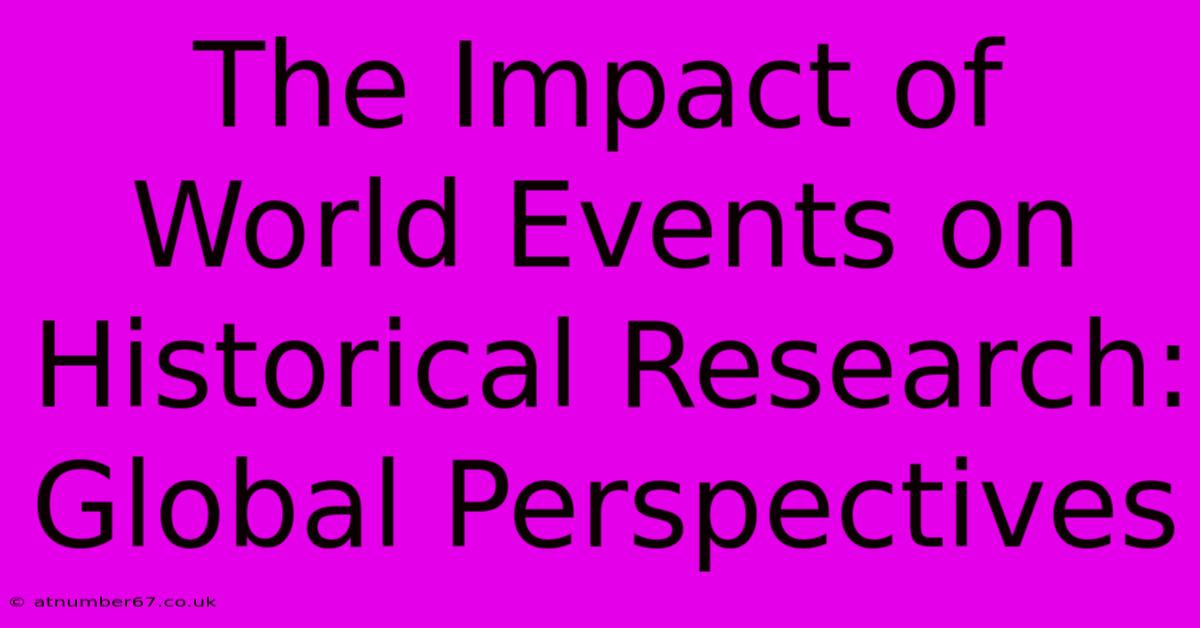The Impact Of World Events On Historical Research: Global Perspectives

Table of Contents
The Impact of World Events on Historical Research: Global Perspectives
World events profoundly shape the landscape of historical research, influencing not only the topics scholars investigate but also the methodologies they employ and the interpretations they offer. This impact reverberates across global perspectives, highlighting the interconnectedness of history and contemporary realities.
The Shifting Sands of Research Focus
Major global events often trigger a surge of interest in related historical periods and themes. The Russian invasion of Ukraine, for instance, has led to a renewed focus on the history of Russo-Ukrainian relations, Cold War dynamics, and the long shadow of imperial legacies. Similarly, the COVID-19 pandemic spurred intense research into past pandemics, the history of public health, and the societal impact of widespread disease outbreaks. These events don't simply add new chapters; they recontextualize existing narratives, prompting historians to reassess previous interpretations in light of new realities.
Unearthing Forgotten Histories:
Global events can bring previously marginalized or overlooked histories into the spotlight. The Black Lives Matter movement, for example, generated widespread interest in the history of slavery, racial injustice, and systemic oppression, prompting renewed scrutiny of historical narratives that had minimized or ignored the experiences of Black communities. This highlights the crucial role of social movements in shaping historical research agendas. The #MeToo movement similarly shifted the focus towards understanding historical gender dynamics and power imbalances.
Methodological Adaptations and Challenges
World events also force historians to adapt their methodologies. The rise of digital technologies and the proliferation of online archives have opened new avenues for research, facilitating the analysis of vast datasets and previously inaccessible sources. However, the digital age also presents challenges, including the verification of online sources, concerns about data privacy, and the need to navigate the complexities of digital preservation.
Navigating Bias and Interpretation:
The interpretation of historical events is inherently subjective, and this subjectivity is amplified during periods of significant global upheaval. The ongoing debate surrounding the legacy of colonialism exemplifies this challenge, with historians grappling with diverse perspectives and interpretations influenced by contemporary political and social contexts. Researchers must be acutely aware of their own biases and strive for objectivity, employing rigorous methodologies to ensure the validity of their findings. The very act of researching history becomes a process of continuous reassessment and refinement.
Global Perspectives: A Tapestry of Experiences
The impact of world events on historical research is not uniform across geographical boundaries. The perspectives and priorities of historians in different regions are shaped by their unique historical experiences and contemporary realities. For example, the impact of climate change is viewed differently by historians in island nations vulnerable to sea-level rise than by those in inland regions. This diversity of perspectives enriches historical understanding, providing a more nuanced and complete picture of the past.
The Future of Historical Research in a Globalized World
In an increasingly interconnected world, historical research must embrace a global perspective. The study of history is no longer confined to national boundaries; instead, it encompasses transnational networks, global flows of information, and cross-cultural interactions. Historians need to collaborate across disciplines and national borders to tackle the complex challenges posed by a rapidly changing world. The future of historical research lies in its ability to engage with contemporary issues, fostering dialogue, and shaping a more informed and globally aware citizenry. By acknowledging the impact of world events, historians can contribute to a more comprehensive and insightful understanding of the human past.

Thank you for visiting our website wich cover about The Impact Of World Events On Historical Research: Global Perspectives. We hope the information provided has been useful to you. Feel free to contact us if you have any questions or need further assistance. See you next time and dont miss to bookmark.
Featured Posts
-
Sam Verzosas 2024 Net Worth His Business Strategies
Apr 12, 2025
-
Twiggys Net Worth A Legacy Of Fashion And Fortune
Apr 12, 2025
-
Tommys Dad A Love Hate Relationship In East Enders
Apr 12, 2025
-
Lili Reinharts Daughters Name Meaning And Origin
Apr 12, 2025
-
Peter Thomas Roth Net Worth And Business Secrets
Apr 12, 2025
